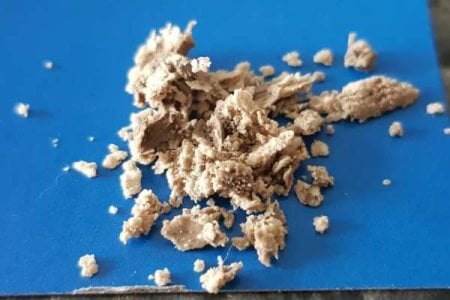Local shares 'crunchy' find after boiling tap water: 'I have never seen residue like this'
By
Danielle F.
- Replies 15
Australians are known for their love of the great outdoors, sunny beaches, and a generally high quality of life.
What happens when something as fundamental as water becomes a cause for concern?
A local's discovery left many Aussies scratching their heads and had everyone asking—is our water safe for drinking?
An anonymous Western Australian resident took to social media to share a photo of a peculiar substance he saw after boiling tap water.
The photo showed a 'crunchy' brown clump resembling a crushed tree bark.
'I boiled away about three litres of Perth tap water, and this is what was left. What is it?' they asked.
The post quickly garnered attention, and people expressed their disgust and confusion over the residue.
'I'm a chef and have boiled Perth water thousands of times. I have never seen residue like this,' one commented.
'That looks particularly excessive for three litres,' another comment read.
'I've always used a water filter since moving to Perth from the country where we always drank rainwater. I can't stand the taste of tap water,' a third wrote.
'Perth water is undrinkable. Maybe you are used to it and don't notice, but it is disgusting for tourists, and bathrooms smell like public pools,' a fourth added.
University of Western Sydney Professor Ian Wright weighed in on the matter.
'It's salt, but not necessarily sodium chloride table salt,' the water expert explained.
Wright, who previously worked for Sydney Water, pointed out that Perth has the saltiest capital city water in Australia.
Mount Yokine water supply topped the charts for salt content in water.
While salt in water may not be a big deal, Wright cautioned that it could have health implications.
'Still, it adds to the salt burden, and people with kidney disease need to be very careful about salt intake.'
Professor Wright warned that high salt intake could raise blood pressure, leading to a host of other health issues.
This revelation showed the importance of being aware of what's in the water being consumed daily.
For those with pre-existing health conditions, water quality could be a significant concern.
Several companies analyse the mineral content of tap water, giving consumers a clearer picture of what they are consuming.
Investing in a good quality water filter could also reduce the amount of salt and other impurities, making tap water safer to drink.

Have you ever encountered anything like this in your tap water? How do you keep your drinking water safe and healthy? Share your stories and tips in the comments below!
What happens when something as fundamental as water becomes a cause for concern?
A local's discovery left many Aussies scratching their heads and had everyone asking—is our water safe for drinking?
An anonymous Western Australian resident took to social media to share a photo of a peculiar substance he saw after boiling tap water.
The photo showed a 'crunchy' brown clump resembling a crushed tree bark.
'I boiled away about three litres of Perth tap water, and this is what was left. What is it?' they asked.
The post quickly garnered attention, and people expressed their disgust and confusion over the residue.
'I'm a chef and have boiled Perth water thousands of times. I have never seen residue like this,' one commented.
'That looks particularly excessive for three litres,' another comment read.
'I've always used a water filter since moving to Perth from the country where we always drank rainwater. I can't stand the taste of tap water,' a third wrote.
'Perth water is undrinkable. Maybe you are used to it and don't notice, but it is disgusting for tourists, and bathrooms smell like public pools,' a fourth added.
University of Western Sydney Professor Ian Wright weighed in on the matter.
'It's salt, but not necessarily sodium chloride table salt,' the water expert explained.
Wright, who previously worked for Sydney Water, pointed out that Perth has the saltiest capital city water in Australia.
Mount Yokine water supply topped the charts for salt content in water.
While salt in water may not be a big deal, Wright cautioned that it could have health implications.
'Australians have too much salt in our diet, and water usually only provides a little,' he stated.'Still, it adds to the salt burden, and people with kidney disease need to be very careful about salt intake.'
Professor Wright warned that high salt intake could raise blood pressure, leading to a host of other health issues.
This revelation showed the importance of being aware of what's in the water being consumed daily.
For those with pre-existing health conditions, water quality could be a significant concern.
Several companies analyse the mineral content of tap water, giving consumers a clearer picture of what they are consuming.
Investing in a good quality water filter could also reduce the amount of salt and other impurities, making tap water safer to drink.
Key Takeaways
- A WA local discovered a brown, rocky clump after boiling Perth tap water, prompting concern online.
- Water expert and professor Ian Wright explained that the substance is likely salt, though not necessarily common table salt.
- The saltiness of the water varies, with Mount Yokine's supply noted as the saltiest and Perth following suit.
- While tap water normally contributes minimal salt to one's diet, Wright cautioned that awareness of salt intake, including from water, is important.








